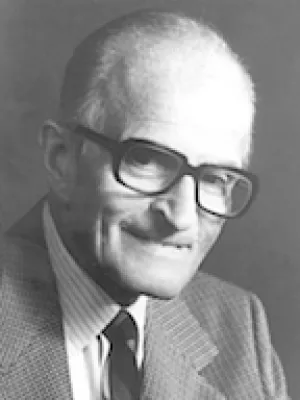Biography
Academic surgery lost one of its most able and revered practitioners on the occasion of the death of Leon Goldman on March 4, 1975, at the age of seventy-one. Dr. Goldman was born in San Francisco, February 14, 1904. His undergraduate education was completed at the Berkeley campus of the University of California, where he received the A.B. degree in 1926, after which he enrolled in the School of Medicine and completed studies for the Doctorate in Medicine, including an internship at San Francisco in 1930.
All of Leon Goldman's post-doctoral professional training was done at the University of California in San Francisco, where he served as a house officer on the University of California service at the San Francisco General Hospital as well as a resident at the University of California Hospital completing surgical training as chief resident in surgery in 1935. There followed a period of service on the faculty of the medical school as an instructor in surgery.
In preparation for a career in academic surgery, Leon Goldman enrolled in 1938 as a graduate student in gastrointestinal physiology under A. C. Ivy at Northwestern University, where he was awarded a Master of Science degree in 1939. He returned to the surgical staff at San Francisco General Hospital as well as to the faculty of the School of Medicine as an assistant professor and advanced successively through the professorial ranks to professor of surgery in 1950. He served also as associate dean of the School of Medicine from 1956 to 1963, as vice chairman of the Department of Surgery from 1953 to 1956, and as chairman from 1956 to 1963. He became professor emeritus in 1971 but continued to serve actively on the clinical teaching service at the Moffitt Hospital up to the time of his terminal illness.
As a leading member of the faculty of the medical school, Dr. Goldman was frequently called to serve on many committees of the Senate and the administration, where he played a notable role, particularly in the reorganization of the services at the San Francisco General Hospital, with special reference to the institution of a cooperative arrangement with the City and County of San Francisco to enable the General
Hospital to mount a vigorous, full-time teaching faculty. This led to the consequent improvement in patient care as well as the teaching of medical students and house staff. He was also a leader in the reorganization of the Veterans Administration Hospital of San Francisco, where for several years he continued to serve as an influential member of the Dean's Committee for that hospital. These latter two hospitals together with the University of California Hospitals on the Medical Center campus now constitute the major clinical research and teaching resources of the University at San Francisco. Their excellence and worldwide prestige is a continuing tribute to the wise and dedicated leadership of Leon Goldman.
A perusal of his record of service to curricular affairs, to student and alumni welfare, and to University-wide education in the health sciences demonstrates his devotion to the highest ideals of an academic surgeon. His outstanding clinical competence and surgical skills were as highly esteemed by his peers as by his patients. His contributions to surgery were recognized by election to membership and distinguished service as an officer in local, national, and international surgical societies, including the presidency of the Pacific Coast Surgical Association and the first vice presidency of both the American Surgical Association and the American College of Surgeons.
Leon Goldman was much in demand as a speaker at professional meetings and postgraduate courses. In addition he maintained a consistently high level of contributions to the literature of surgery through both research papers and clinical reports to improve the practice and teaching of surgery. Dr. Goldman's clinical and laboratory investigations made him an international figure of gastrointestinal and endocrine surgery. For many years he ranked among the two or three leading surgical pioneers in these fields.
Although his distinguished career as a surgeon and his recognition among the leaders in academic surgery were widely appeciated, he took great pleasure in the realization that he was able also to serve his students, as was evident by their unrestrained admiration of his efforts in their behalf. Among the many surgical residents he guided and inspired, he was complimented by their particular term of endearment for him--to them he was “the Coach.” Although the Coach has left the bench, the teams he trained will continue to manifest his “coaching” ability for many years to come.

